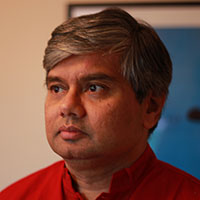Contributor : Profile
From 2019 he is the Director of UNU-WIDER, and he is a professor of development economics at the Global Development Institute, University of Manchester.
Kunal Sen was educated at Elphinstone College, Jawaharlal Nehru University, Delhi, and Rutgers University, USA. He is currently Professor of Development Economics at the Institute of Development Policy and Management (IDPM), University of Manchester, UK, and Associate Director of the Brooks World Poverty Institute. His main research areas are economic growth, the analysis of poverty and labour markets, international trade and finance. His current research examines firm dynamics in the informal sector, the political economy determinants of economic growth, and the role of institutions in economic development. Some of the current research is being carried out within the DFID-UK funded Effective States and Inclusive Development (ESID) Research Centre, based in the University of Manchester (www.effective-states.org), of which he is the Joint Research Director. Until 2011, Professor Sen was the Chair of the British Association for South Asian Studies, one of the world’s largest learned societies on South Asia. Professor Sen’s recent books are State-Business Relations and Economic Development in Africa and India, London: Routledge 2012; Trade Policy, Inequality and Performance in Indian Manufacturing, London: Routledge 2008, International Competitiveness, Investment and Finance: A Case-study of India (with A.G. Kumar and R. Vaidya), London: Routledge 2003, and Saving, Investment and Growth in India (with P. Athukorala), Delhi: Oxford University Press, 2002. He has been awarded the Sanjaya Lall Prize in 2006 and Dudley Seers Prize in 2003 for his publications. He is member of the ESRC Peer Review College, and South Asia Area Panel of the British Academy, as well as Research Fellow of IZA, Bonn.
Posts by Kunal Sen
What explains the increasing use of contract workers in Indian manufacturing?
Contract workers constituted about one-fourth of all workers in formal manufacturing in India in 2008. This column analyses the extent to which trade liberalisation and lack of labour reforms explain...
-
 Bibhas Saha
Bibhas Saha  Kunal Sen
Kunal Sen  29 October, 2014
29 October, 2014
- Articles
The puzzle of declining labour intensity in organised Indian manufacturing
It is surprising to note that labour intensity in the organised manufacturing sector in India, particularly in industries with greater labour requirements, has shown a sustained decline over the past...
-
 Kunal Sen
Kunal Sen  25 April, 2014
25 April, 2014
- Articles
Helping India's informal manufacturing sector to grow
India’s informal manufacturing sector is dominated by small household enterprises that keep everything within the family – but these firms are often the least productive. Why aren’t these small ...
-
 Kunal Sen
Kunal Sen  09 January, 2013
09 January, 2013
- Articles
How Important are credit constraints for small firm growth?
This project focusses on the role of financial constraints in determining the lack of transition of firms from the very small family firms (OAMEs) which are the predominant type of firms in the inform...
-
 Kunal Sen
Kunal Sen  01 December, 2012
01 December, 2012
- IGC Research on India




